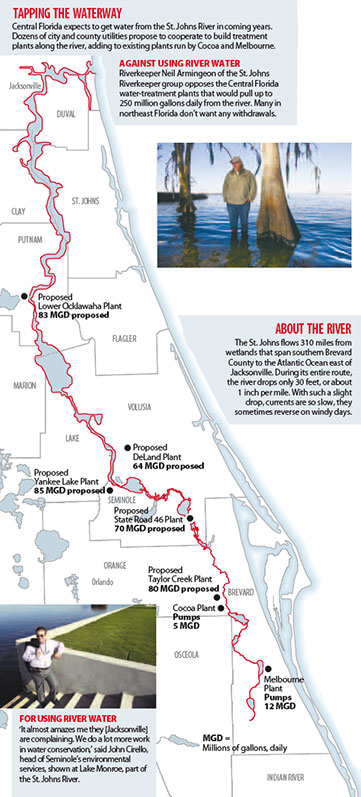
Whose Thirst Comes First? Orlando, Jacksonville Areas Face Water War
Kevin Spear - Orlando Sentinel Staff Writer
HOLLY NOTE: If you took the advice in Dare To Prepare about storing food and water as a hedge against bad times, you should be sitting pretty now.
December 9, 2007
Northeast Florida has launched a campaign to prevent thirsty Central Florida from pumping water out of the St. Johns River.
A growing coalition of Jacksonville-area environmentalists and politicians hopes to shield the north-flowing river from proposals to divert as much as 250 million gallons each day to Orlando-area communities.

Graphic: Florida's Water Wars, the St. Johns River
It's an early salvo in what could become a bruising conflict over a waterway that flows mostly unnoticed east of Orlando but more than 100 miles downstream carves a dramatic riverfront through the heart of Jacksonville.
"We think by January, our goal is to have 20 to 30 entities at every level of government and civic groups that go on record opposing the idea," said Neil Armingeon, who serves as Riverkeeper for the St. Johns Riverkeeper group and has been credited widely for triggering a critical mass of attention to proposed withdrawals. "I'm not saying Orlando is the devil, but we aren't going to be silent on this."
Central Florida officials, however, say they have little choice but to tap the river, and they are already designing water-treatment plants to do it. The once-plentiful supply of underground water can't keep up with Orlando's rapid population growth.
The St. Johns looks mightier than it is. Though wide as the Mississippi River in places, the river flows so weakly a steady wind will force it to run backward. Near Jacksonville, tides from the Atlantic Ocean fill much of the river. But that blend of fresh and salt water creates an estuary for shrimp, oysters, crabs, clams and countless other species.
"Nobody can say what will happen when you take out a huge amount of the river's fresh water," said Richard Bryant, chief resource manager for the federally protected 46,000-acre Timucuan Ecological and Historic Preserve along the river. "But when you change the mix of salt, you are going to change what's living there."
FLORIDAN AQUIFER COULD BE AT RISK
Utilities in Central Florida would rather not pump a drop from the river.
They are preparing to do so only after nearly a decade of persistent coaxing and financial carrots from regional water authorities, who say dipping from the river is a critical step in averting an environmental mess of another sort.
The nearly exclusive source of Orlando drinking water -- the deep-underground Floridan Aquifer -- is now being pumped through wells at the rate of about a half-billion gallons a day.
Extracting more, according to the St. Johns River Water Management District, will run the risk of poisoning the subterranean reservoir with seawater and sap spring flows, dry up wetlands and turn lakes into dust bowls. Those predications so unnerve authorities that they vow to halt any new aquifer pumping by 2013.
By then, at least two megaplants, now jointly pursued by nearly two dozen utilities and ultimately costing more than $1 billion combined, could have their steel snouts sucking from the St. Johns River.
Local utility leaders were surprised, then, to hear only this month that their reluctant plans for the river are now drawing stiff opposition. All too suddenly, the Orlando area's need for the river and the Jacksonville area's fear for the river suggest yet another water war is in store for Florida.
"I think this is an early hint that there could be one," said Orange County Utilities Director Mike Chandler, who, like other local officials, dreads the prospect of legal attacks, political assaults and intracity feuding. "Let's work together."
SEWAGE RECYCLING HIGH LOCALLY
In many respects, the budding dispute resembles the high-stakes battle between North Georgia and the Florida Panhandle.
In the middle of an extreme drought, the Atlanta area wants to hoard water that flows from the dam at massive Lake Lanier, down the Chattahoochee River and into Florida's Apalachicola River and Bay.
Florida residents and authorities covet that water as essential to the bay's seafood industry -- one of the state's signature attractions -- and to endangered fish and shellfish in the river.
But while Florida knocks Atlanta for wasting water, Metro Orlando stands among more progressive water-conserving communities in the Southeast.
For starters, Central Florida's long-standing lawn-irrigation restrictions are enforced sporadically but by officers armed with violation notices. The area also recycles nearly half of its sewage for lawn and landscape irrigation, supplanting demand for aquifer water.
In Jacksonville, relatively new irrigation restrictions are voluntary, and only about 5 percent of sewage is reused.
"It almost amazes me they are complaining," said John Cirello, director of Seminole County's environmental services. "We do a lot more work in water conservation."
Jacksonville officials concede that point but raise another issue.
"There's no question Orlando is ahead of us," said Susie Wiles, spokeswoman for Jacksonville Mayor John Peyton. "There's also no question Orlando is a leader in uncontrolled growth."
'A LIMITED AMOUNT OF WATER'
For now, officials at the St. Johns River Water Management District are the only arbiters of the river's future.
Executive Director Kirby Green has met repeatedly in recent weeks with Jacksonville-area groups to plead a case that his agency will find a balance between drinking water and river ecology.
"What we are telling people is there is only a limited amount of water from the St. Johns," Green said.
Armingeon and others don't want Central Florida to depend on any amount.
"Orlando has grown at rate that, frankly, is not sustainable," Armingeon said. "The quick fix, the typical Florida political fix, is stick a pipeline in the St. Johns River, skim as much water as you can and 10 years from now when the river is dead, and we still don't have enough water, then we'll fix it."
http://www.orlandosentinel.com/news/local/state/orl-water0907dec09,0,4281811.story?coll=orl_tab01_layout
www.standeyo.com/NEWS/07_Food_Water/071209.FL.water.wars.html
